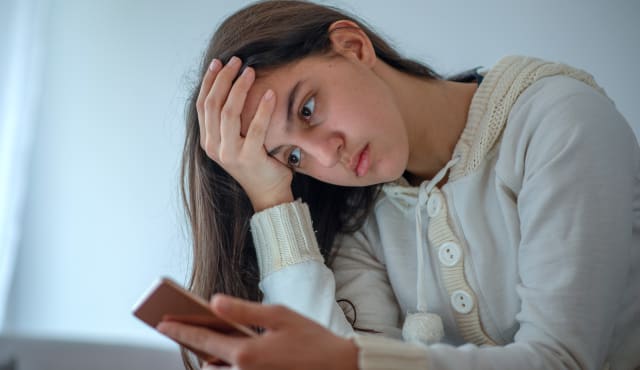Should kids get screen time?
Tips and recommendations from the pros.
Article Date:

There's no escaping it: We live in a digital era with new technology coming out every day. While today’s tech-savvy parent might have the latest and greatest device loaded with apps, how and when should children be allowed access to the same technology? Are all screens and content created equal? Let’s turn to the experts to find out.
Screen-free learning for toddlers
The American Academy of Pediatrics (AAP) recommends children under 18 months not have screen time. Additional research has shown that children under the age of 2 experience a "video deficit," meaning they don’t learn and absorb information well when it’s delivered on a screen.
“Children under the age of 2 require hands-on learning and social interaction to develop language, social-emotional and cognitive skills. That’s why toys and other objects like puzzles and blocks that provide hands-on interaction are great for young children,” said Lee Ann Annotti, PhD, a licensed psychologist with Baptist Behavioral Health and Wolfson Children’s Behavioral Health.
Choosing quality screen time for kids
Once your infant enters toddlerhood, they’re more likely to benefit from all the screen offers. Still, according to Dr. Annotti, the type of content makes a difference.
Luckily, parents have several options for high-quality, developmentally appropriate media for their little ones. Some apps and television programs support vocabulary development, social skills and emotional education, among other benefits.
“For children ages 2 to 5, the AAP recommends only one hour of screen time per day and emphasizes that screen time should be with high-quality programming, such as PBS, Mr. Rogers’ Neighborhood and Sesame Workshop, for example,” she said. “For children 6 and older, it’s recommended that parents balance screen time with social activities, play, homework and family time. This balance should also be applied to children ages 2 to 5.”
Making screen time a family activity
Mark Bedard, DO, a pediatrician with Orange Park Pediatrics in Argyle Forest, agreed.
"Screen time should be a family or adult-supervised event. I would recommend the parent watch and interact with the child to enhance the learning the child gets out of the show,” said Dr. Bedard. "As doctors, we look at screen time as a whole. That includes tablets, phones, television, computers and video games."
Dr. Annotti added that while media and screen time can provide benefits to children like increased access to knowledge, social contact and support, and health information, it can also negatively impact sleep, attention levels and learning. She said parents and caregivers should also always monitor and supervise the content.
“Parental supervision is one of the most important aspects in decreasing behavioral problems,” Dr. Annotti said.
Remember, screen time should be kept on the sidelines through infancy and remain a group sport with toddlers, preschoolers and older children. Watching what your child views on the television or tablet can also show your child that you’re tuned in to their interests and you want to spend time with them, Dr. Annotti said.
“Watching along with your child provides the necessary supervision to ensure your child’s safety while investing in your child’s self-esteem. Media time can become a family activity,” she said. “Choose a movie, television show or computer game, and make it into a family night activity.”
Need help managing screen time?
If your child’s screen time is interfering with their daily activities or affecting their quality of life, a Wolfson Children’s Behavioral Health specialist can help. Call 904.376.3800 to make an appointment.
Source: American Academy of Pediatrics



